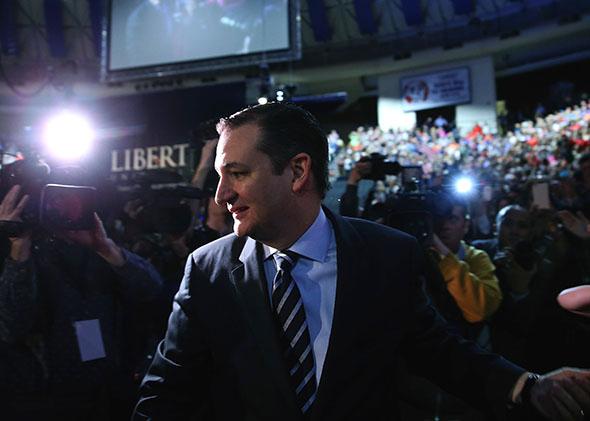Ted Cruz defended his lack of executive experience this weekend saying that he is not a “community organizer.” The Texas senator explained that unlike Barack Obama, who also ran for president after one term in the Senate, he had accomplished more before becoming a legislator. Cruz pointed to his period as solicitor general of Texas—an answer that was itself a display of the debating talents his supporters say qualify him to be president. Cruz wasn’t answering the question as much as redefining the criteria. A lack of executive experience cannot be overcome by simply not having the attributes of the last president who also lacked it.
On the strict comparison, Cruz has more leadership experience than Obama had at the beginning of his presidential campaign. Over five and a half years as solicitor general, Cruz led a large agency with hundreds of lawyers. Obama never ran an equally complex organization.
But that’s not the operative issue when executive experience is the question. The practical question is whether he has the kind of skills the Republican governors he’s competing against use every day and which most closely approximate the ones a president needs.
The reason this matters is that previous competency gives us some indication about whether a politician can back up the promises he makes with results. That was the critique George W. Bush leveled against John McCain in the 2000 race. The Arizona senator called himself a “reformer” and Bush retorted that as Texas governor he was a “reformer with results.” The distinction matters particularly when you promise an agenda as sweeping as Cruz does.
The skills governors need include the ability to read the political landscape, pick priorities, build consensus among friends and foes, and convey their will to others.
Cruz has no problem with setting priorities. He knows what he wants to do. What he hasn’t demonstrated is any significant achievement as a political leader that compares with his opponents. John Podhoretz put it bluntly in the New York Post: “Ted Cruz’s challenge: The other guys have done things.”
A key requirement for a president is building relationships and mobilizing the bureaucracy. In these two areas Cruz has shown the opposite of proficiency. His Senate colleagues would agree that he’s no community organizer. He is known more for the disorder he creates in his community. In fact, that’s what he’s running on: his stalwart opposition to the temporizing and capitulating GOP lawmakers in Washington. In the Senate, he has created more enemies than friends. This thrills his supporters, but it is not a recipe for governing. Cruz is good at winning a debate, but those talents haven’t translated to winning over the minds of his colleagues who didn’t already agree with him before he started. Their chief complaint is that while he may have focus, he is incapable of striving for anything besides symbolic goals. Governors can’t afford to do that kind of thing. In the same way that a governorship or presidency isn’t the same as a boardroom, it’s also not the same as a courtroom.
Never mind, say Cruz’s supporters: He’ll have the support of the grassroots who will put pressure on lawmakers to do the right thing. Cruz has a strong relationship with the party’s base and he used it effectively to win his Senate seat. He overcame the establishment candidate in Texas with aplomb. His supporters will tell near-magical stories about his ability to raise the fortunes of politicians of whom he gives his support. But Obama also argued that voters could learn something about his executive talents from his electoral successes, so this would be a strange argument for Cruz to champion. Also as Obama proved once in office, there are limits to the power of stirring the grassroots to achieve executive rather than political goals. Plus, the idea that a candidate skilled at focusing grassroots passion could change the entire shape of government is an argument for community organizing. Cruz may be good at it, but he says he’s not.
